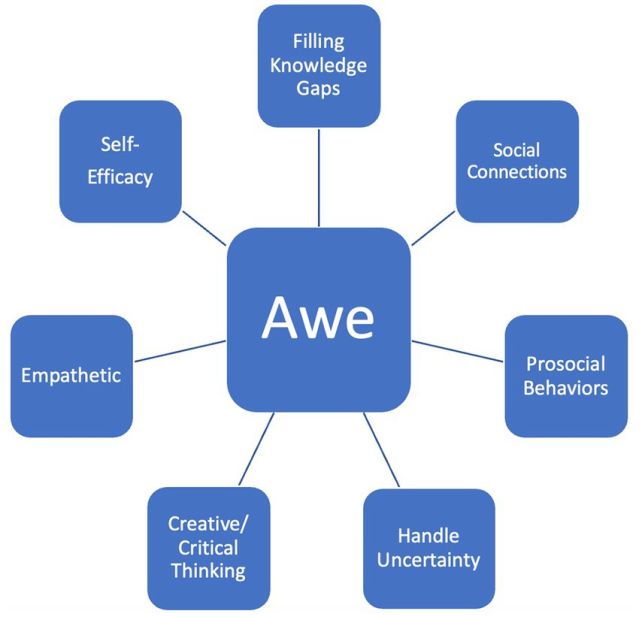Resilience
In Awe of NASA: Leadership and Resilience Skills
Supporting the notion that NASA "really is the best place to work".
Updated June 12, 2023 Reviewed by Abigail Fagan
Key points
- Reflecting on moments of awe can support leadership and resilience.
- Awe reflections can contribute to finding meaning and purpose in life.
- Awe can be found in everyday moments, including at work.
In a new research study I published in the journal Frontiers of Psychology, titled "NASA resilience and leadership: examining the phenomenon of awe," insight was gained from a leader at the National Aeronautics and Space Administration (NASA).
This specific study, which is part of a larger Awe Project, is one of multiple studies in Frontier’s special research topic on Searching for Meaning in Work and Life: Happiness, Wellbeing, and the Future of Organisations. This study examined how awe can support the leadership qualities and resilience practices of a NASA leader whose work includes looking after the well-being of astronauts (their name is remaining anonymous in adherence with the research study protocols).
The concept of awe was utilized as the focus point of the study to explore resilience and leadership, because previous research that I've conducted with leaders, hostage negotiators (and here), investigators, and the general public has shown it can enhance resilience, support leadership skills, as well as contribute to better overall well-being. This includes reflecting on, sharing, and being exposed to awe narratives.
Awe can be a gateway to leadership and resilience practices and traits such as agency, critical and creative thinking, empathy, gratitude, handling uncertainty and ambiguity, humility, prosocial behaviors, self-efficacy, and social connections. Importantly, awe can support finding meaning and purpose in life with both work and in our personal lives.

The following snippets are from the research study on how the above impacts this NASA leader with their work.
Being part of a team, contributing to something bigger than themselves, and gratitude:
Everyone is dedicated to the common cause of something greater than ourselves. Everyone that I work with can make more money somewhere else. So, in short, yeah, it’s been a remarkable experience. I am extremely grateful.
When people tell you NASA is the best place to work, it’s not an exaggeration: it really is.
More on teamwork:
I think it’s easier to perform with true superior quality if you are working with people that you feel passionately about supporting, and really enjoy each other’s company.
Leading to have astronauts thrive, not just get by:
We [primarily NASA psychiatrists and psychologists] work directly in support of human space flight missions… our group works directly with astronauts … providing them with the services that they need to optimally fly a human space flight mission.
Not just get by … but how to perform optimally under the most difficult circumstances.
These are high performing individuals [the astronauts]. [Our job is] to get people, not only [to] perform their best, but also when they come back from the mission to not be worn out, or burnt out.
Humility:
“I realized, ‘Hey, I’m not the smartest person in the room almost ever anymore. And, I tell you, it’s been a blessing, it’s just been incredible.’”
Having a sense of agency (control what you can); thinking about what way are you contributing to your organization’s culture:
The hardest place I ever worked [not NASA] … it was a very difficult place to work. And I saw people that were there to put their 30 years in and were completely miserable, completely miserable. And it was a miserable job, but at the same time they bought into that.
Awe and its relationship to having meaning and purpose:
[Awe is] something that you are looking at, something that you read, something that you feel, something that you are doing that makes you feel wonderful.
[Awe] makes you feel that you are part of something great that’s inspiring—that inspires you to want to learn more, to do more. It makes you feel more passionate about something or just makes you feel wonderful.
More on meaning and purpose, as well as how value is measured:
I’m grateful that I have a job where I’m not just earning money. I’m doing something that’s way beyond just coming here to get paid, way beyond that.
Awe’s relationship to slowing down, being present, and mindfulness:
Most of us are either worried about the past even though we cannot change it or [are] concerned about the future when we do not know really what’s going to happen and we might not live to see the future.
[Awe] inspires you to live in the here and now, to be in the moment, to be centered.
Finding awe in “everyday” work:
There are times in which I’ll either drive into work or leave work and it might be just a regular day, right? A regular day.
But going into work and seeing the big sign, the Space Center or leaving work. And it might be 6:30 p.m. and my car might be the last one in the parking lot, leaving the building and feeling that sense of, hey, this was a good day.
I still love working here.
Conclusion
This NASA medical expert and leader has provided us with insight into their approach to leadership and resilience as well as the impact awe can have in their work and personal life. They have shined a light on how it is possible to be a “modern leader,” a person that is goal-focused and human-centered.
Although we most likely will never become an astronaut or serve as a NASA leader, we can all still learn from them. It’s up to us now to identify ways to implement awe into our work and personal lives.
References
Thompson, J. (2023). NASA resilience and leadership: Examining the phenomenon of awe. Frontiers in Psychology/Positive Psychology. https://www.frontiersin.org/articles/10.3389/fpsyg.2023.1158437/abstract
Thompson, J. & Jensen, E. (2023). Hostage negotiator resilience: A phenomenological study of awe. Frontiers in Psychology/Clinical Settings, https://www.frontiersin.org/articles/10.3389/fpsyg.2023.1122447/full
Thompson, J. (May, 2023). Experiencing awe: An innovative approach to enhance investigations and wellness. The IACP Police Chief Magazine. https://www.policechiefmagazine.org/experiencing-awe/
Thompson, J. (accepted for publication; May 2023). Narrative health: Examining the relationship between the phenomenon of awe with resilience and wellbeing. Journal of Community Safety and Well-Being.
Thompson, J. (2022). Enhancing resilience: An interpretative phenomenological analysis of The Awe Project. Journal of Community Safety and Well-Being, 7(3), 93-110. https://doi.org/10.35502/jcswb.265
Thompson, J., Grubb, A.R., Ebner, N., Chirico, A., & Pizzolante, M. (2022). Increasing crisis hostage negotiator effectiveness: Embracing awe and other resilience practices. Cardozo Journal of Conflict Resolution, 23(3), 615-685. https://static1.squarespace.com/static/60a5863870f56068b0f097cd/t/62c5b…
Thompson, J. (2022). Awe: Helping leaders address modern policing problems. Journal of Community Safety and Well-Being, 7(2), 53-58. https://doi.org/10.35502/jcswb.239
Thompson, J. (2022). Awe narratives: A mindfulness practice to enhance resilience & wellbeing. Frontiers in Psychology/Positive Psychology. https://www.frontiersin.org/articles/10.3389/fpsyg.2022.840944/abstract
Thompson, J. (2022). Your Daily Dose of Awe: Accessing Real Resilience. PsychologyToday.com. https://www.psychologytoday.com/us/blog/beyond-words/202201/your-daily-dose-awe-accessing-real-resilience




